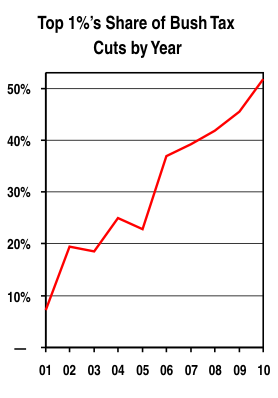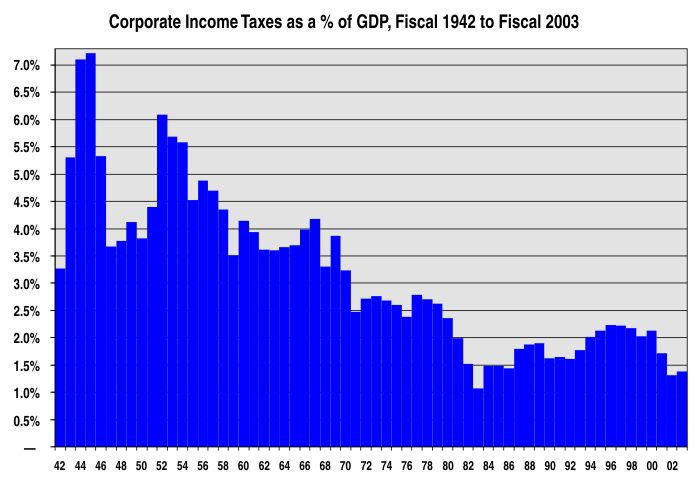April 17, 2002 04:07 PM | Permalink | 
Click here to see this analysis in PDF format.
Click here for a chart showing trends in corporate income taxes.
A startling surge in corporate tax welfare is expected to drive corporate income taxes over the next two years down to only 1.3 percent of the gross domestic product. That will be the lowest level since the early 1980s—and the second lowest level in at least six decades.
| Corporate Tax Welfare, fiscal 2002 & 2003 |
| $-billions |
2002 |
2003 |
Source |
| Official tax-expenditure list, pre-stimulus bill |
$ 91.3 |
$ 95.1 |
JCT |
| Plus items not on official list— |
| Meals & entertainment |
4.1 |
4.3 |
CTJ/CBO |
| Offshore tax shelters |
>18.0 |
>19.0 |
CTJ |
| Inconsistent treatment of stock options |
>20.0 |
>21.0 |
CTJ |
| Plus new corporate items in stimulus bill |
37.7 |
35.8 |
JCT/CTJ |
| Total corporate tax welfare |
$ 171.1 |
$ 175.2 |
|
| Compare: |
| Expected corporate income tax payments* |
$ 136.3 |
$ 151.2 |
CBO |
*FY 2002 figure excludes FY 2001 to 2002 two-week estimated tax payment shift.
Sources: Joint Committee on Taxation (JCT), Citizens for Tax Justice (CTJ) and Congressional Budget Office (CBO), 2002, as noted. |
Driven in part by the new corporate tax breaks just enacted in the so-called “stimulus” bill, the total cost to ordinary American taxpayers of corporate tax welfare will exceed $170 billion annually in each of the next two years.
In fact, for the first time since the early eighties, corporate tax loopholes will actually cost more than companies pay in income taxes in fiscal 2002 and 2003.
What has this meant for specific companies?
Even before this year’s new corporate loopholes, corporate tax welfare had been expanding rapidly. Tax breaks for stock options, congressional indifference to abusive offshore corporate tax shelters, and other tax breaks have allowed many companies to earn billions in profits, yet pay little or nothing in federal income taxes.
From 1996 through 2000, just ten large profitable companies enjoyed a total of $50 billion in corporate tax breaks. That brought their combined tax bills down to only 8.9 percent of their $191 billion in U.S. profits over the five years. In just the most recent two years for which data are available, these ten companies got $29 billion in tax welfare, and paid a mere 5.9 percent of their profits in federal income taxes.
Microsoft enjoyed more than $12 billion in total tax breaks over the past five years. In fact, Microsoft actually paid no tax at all in 1999, despite $12.3 billion in reported U.S. profits. Microsoft’s tax rate for the past two years was only 1.8 percent on $21.9 billion in pretax U.S. profits.
General Electric, America’s most profitable corporation, reported $50.8 billion in U.S. profits over the past five years, but paid only 11.5 percent of that in federal income taxes. That low tax rate reflected almost $12 billion in corporate tax welfare for GE.
Ford enjoyed $9.1 billion in corporate tax welfare over the past five years. It reported $18.6 billion in U.S. profits over the past two years, but paid a tax rate of only 5.7 percent.
Worldcom paid no taxes at all in two of the last three years, despite reported U.S. profits of $15.2 billion. Worldcom’s total tax rate over the three years was only 1.6%. Corporate tax welfare slashed Worldcom’s tax bill by $5.3 billion over the past five years.
IBM reported $5.7 billion in U.S. profits in 2000, but paid only 3.4 percent of that in federal income taxes. In 1997, IBM reported $3.1 billion in U.S. profits, and instead of paying taxes, got an outright tax rebate. Over the past five years, IBM enjoyed a total of $4.7 billion in corporate tax welfare.
General Motors paid no taxes at all in three of the last five years, despite $12.5 billion in reported U.S. profits. GM’s tax rate for the past three years was negative 1.3 percent. Its corporate tax welfare totaled $3.6 billion over the past five years.
Enron paid no income taxes at all in four of the past five years, despite $1.8 billion in reported U.S. profits. Enron’s total taxes over the five years were a negative $381 million. Its corporate tax welfare totaled $1.0 billion.
El Paso Energy reported $1.6 billion in U.S. profits over the past five years, but paid less than nothing in federal income taxes, getting tax rebates of $254 million. El Paso’s tax rate over the five years was negative 15.5 percent. Its corporate welfare totaled $827 million.
Colgate-Palmolive paid no taxes at all in three of the past five years, despite $1.6 billion in reported U.S. profits. Colgate’s total tax rate over the five years was negative 1.3 percent, due to $595 million in corporate tax welfare.
Navistar, on $1.4 billion in U.S. profits over the past five years, paid only $28 million in federal income taxes, a tax rate of only 2 percent. Navistar’s corporate tax welfare totaled $451 million.
| U.S. Profits, Federal Income Taxes & Tax Breaks for Ten Major American Companies |
| $-millions |
2000 |
1999 |
1998 |
1997 |
1996 |
1996-2000 |
1999-2000 |
| Microsoft * |
|
|
|
| Pretax US profit |
9,611.9 |
12,254.6 |
11,586.3 |
6,448.3 |
4,343.2 |
44,244.3 |
21,866.5 |
| Federal income tax |
1,177.0 |
–791.0 |
920.0 |
965.0 |
914.0 |
3,185.0 |
386.0 |
| Effective rate |
12.2% |
–6.5% |
7.9% |
15.0% |
21.0% |
7.2% |
1.8% |
| Total tax breaks |
2,187.2 |
5,080.1 |
3,135.2 |
1,291.9 |
606.1 |
12,300.5 |
7,267.3 |
| General Electric |
|
|
|
| Pretax US profit |
13,102.4 |
11,471.6 |
9,848.5 |
8,323.2 |
8,118.8 |
50,864.5 |
24,574.0 |
| Federal income tax |
2,312.9 |
949.8 |
925.0 |
850.6 |
807.5 |
5,845.9 |
3,262.7 |
| Effective rate |
17.7% |
8.3% |
9.4% |
10.2% |
9.9% |
11.5% |
13.3% |
| Total tax breaks |
2,272.9 |
3,065.2 |
2,522.0 |
2,062.5 |
2,034.0 |
11,956.7 |
5,338.2 |
| Ford |
|
|
|
| Pretax US profit |
9,443.0 |
9,182.0 |
8,323.0 |
8,378.0 |
5,482.0 |
40,808.0 |
18,625.0 |
| Federal income tax |
598.5 |
461.3 |
1,405.3 |
2,104.3 |
632.5 |
5,201.9 |
1,059.8 |
| Effective rate |
6.3% |
5.0% |
16.9% |
25.1% |
11.5% |
12.7% |
5.7% |
| Total tax breaks |
2,706.5 |
2,752.4 |
1,507.7 |
828.0 |
1,286.2 |
9,080.9 |
5,458.9 |
| Worldcom |
|
|
|
| Pretax US profit |
6,324.3 |
6,123.5 |
2,724.2 |
670.7 |
183.4 |
16,026.0 |
12,447.8 |
| Federal income tax |
1,122.6 |
–763.6 |
–112.6 |
21.2 |
30.9 |
298.5 |
359.0 |
| Effective rate |
17.8% |
–12.5% |
–4.1% |
3.2% |
16.9% |
1.9% |
2.9% |
| Total tax breaks |
1,090.8 |
2,906.9 |
1,066.1 |
213.6 |
33.3 |
5,310.6 |
3,997.7 |
| IBM |
|
|
|
| Pretax US profit |
5,679.0 |
5,620.0 |
2,821.0 |
3,110.0 |
3,302.0 |
20,532.0 |
11,299.0 |
| Federal income tax |
191.0 |
1,214.0 |
752.0 |
–266.0 |
564.0 |
2,455.0 |
1,405.0 |
| Effective rate |
3.4% |
21.6% |
26.7% |
–8.6% |
17.1% |
12.0% |
12.4% |
| Total tax breaks |
1,796.7 |
753.0 |
235.4 |
1,354.5 |
591.7 |
4,731.2 |
2,549.7 |
| General Motors |
|
|
|
| Pretax US profit |
2,947.0 |
3,848.0 |
952.0 |
3,215.0 |
1,506.0 |
12,468.0 |
6,795.0 |
| Federal income tax |
–104.8 |
22.6 |
–19.0 |
1,236.9 |
–395.4 |
740.3 |
–82.2 |
| Effective rate |
–3.6% |
0.6% |
–2.0% |
38.5% |
–26.3% |
5.9% |
–1.2% |
| Total tax breaks |
1,136.2 |
1,324.2 |
352.2 |
–111.6 |
922.5 |
3,623.5 |
2,460.5 |
| Enron |
|
|
|
| Pretax US profit |
618.0 |
351.0 |
189.0 |
87.0 |
540.0 |
1,785.0 |
969.0 |
| Federal income tax |
–278.0 |
–104.9 |
–12.5 |
17.4 |
–3.4 |
–381.4 |
–382.9 |
| Effective rate |
–45.0% |
–29.9% |
–6.6% |
20.0% |
–0.6% |
–21.4% |
–39.5% |
| Total tax breaks |
494.3 |
227.7 |
78.7 |
13.1 |
192.4 |
1,006.1 |
722.0 |
| El Paso Energy |
|
|
|
| Pretax US profit |
1,032.8 |
–213.4 |
383.7 |
371.9 |
62.0 |
1,636.9 |
819.4 |
| Federal income tax |
–161.0 |
–57.0 |
–3.0 |
–56.0 |
23.0 |
–254.0 |
–218.0 |
| Effective rate |
–15.6% |
nm |
–0.8% |
–15.1% |
37.1% |
–15.5% |
–26.6% |
| Total tax breaks |
522.5 |
nm |
137.3 |
186.2 |
–1.3 |
826.9 |
504.8 |
| Colgate-Palmolive |
|
|
|
| Pretax US profit |
473.7 |
387.0 |
348.5 |
261.6 |
166.9 |
1,637.7 |
860.6 |
| Federal income tax |
49.7 |
–57.8 |
–19.6 |
–19.3 |
25.4 |
–21.7 |
–8.2 |
| Effective rate |
10.5% |
–14.9% |
–5.6% |
–7.4% |
15.2% |
–1.3% |
–0.9% |
| Total tax breaks |
116.1 |
193.3 |
141.6 |
110.9 |
33.0 |
594.9 |
309.4 |
| Navistar |
|
|
|
| Pretax US profit |
141.0 |
485.0 |
400.0 |
236.0 |
106.0 |
1,368.0 |
626.0 |
| Federal income tax |
4.0 |
11.0 |
4.0 |
8.0 |
1.0 |
28.0 |
15.0 |
| Effective rate |
2.8% |
2.3% |
1.0% |
3.4% |
0.9% |
2.0% |
2.4% |
| Total tax breaks |
45.4 |
158.8 |
136.0 |
74.6 |
36.1 |
450.8 |
204.1 |
| Total, these 10 Cos. |
|
|
|
| Pretax US profit |
49,373.0 |
49,509.3 |
37,576.2 |
31,101.7 |
23,810.3 |
191,370.4 |
98,882.3 |
| Federal income tax |
4,912.0 |
884.4 |
3,839.6 |
4,862.0 |
2,599.6 |
17,097.5 |
5,796.3 |
| Effective rate |
9.9% |
1.8% |
10.2% |
15.6% |
10.9% |
8.9% |
5.9% |
| Total tax breaks |
12,368.6 |
16,461.6 |
9,312.1 |
6,023.6 |
5,734.0 |
49,882.1 |
28,812.5 |
*Microsoft’s fiscal years end in June of year following the calendar years listed.
Source: Corporate annual reports and forms 10-K. |
![]()




 receive tax cuts totaling almost half a trillion dollars. The $477 billion in tax breaks the Bush administration has targeted to this elite group will average $342,000 each over the decade.
receive tax cuts totaling almost half a trillion dollars. The $477 billion in tax breaks the Bush administration has targeted to this elite group will average $342,000 each over the decade. 